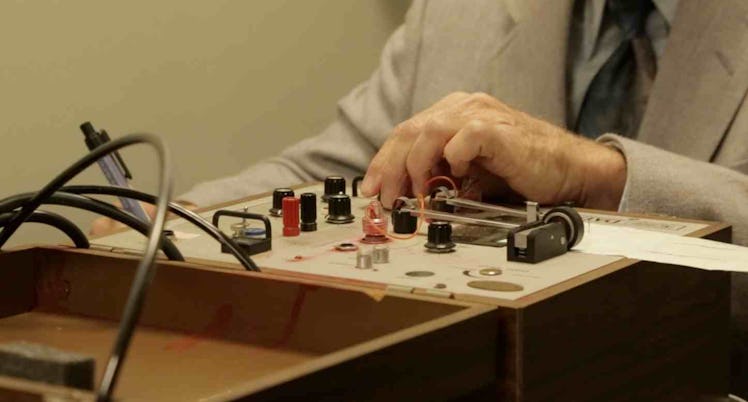Figure Out If Your Kid Is Lying To You With These Tips From An FBI Agent
Are their pants on fire?

You think you’ve watched enough Columbo to know when someone is lying. (It’s always the guy to whom Columbo says, “Ah, just one more thing …”) In reality, there’s no better than a 50-50 shot you’re right, according to Joe Navarro, a former FBI special investigator for 45 years who has done over 10,000 interviews. “Unfortunately, there is no Pinocchio effect,” says Navarro, whose job would have been much easier if he could have relied on a criminal’s growing nose. Instead he had to learn all those telltale — though frequently misleading — signs of fibbing. Ironically, if you’re focusing too much on a your kid’s “tell,” you’re missing your best chance at receiving truthful answers.
By the way, your daughter isn’t sleeping over a friend’s house, she’s actually in Tijuana right now.
Learn To Detect Truth, Not Lies
The body has a tendency to show the stress caused by lying, which can manifest as eye aversion, lip biting, chin lowering, eye squinting, or hand-wringing, he says. But there’s one good reason why you shouldn’t try to turn yourself into a human polygraph. Your questions could elicit the same behaviors as lying, even if your kid’s telling the truth. “The mere fact that we are accusing a child can make the child nervous or tense,” says Navarro. “There’s too much focus on detecting lies. It’s more important to detect truth.”
There Is No Interrogation Room
You’ve rounded up the usual suspects (your family), and now you want to grill them under a 100 watt bulb, right? Nope. The word “interrogation” doesn’t even enter Navarro’s lexicon. “If you have to do interrogation, you don’t know what you’re doing,” he says. instead Navarro uses the word “interview.” It connotes the proper way to approach suspects and people of interest, because you’re not going to get the best out of someone shitting their pants — potty-trained or not.
Translating Body Language
“Parents usually stand directly in front of the kid, arms akimbo with a rigid neck and a laser-like stare. It’s very intimidating,” Navarro says. “It’s one of the worst things you can do to get at the truth.” This creates an uncomfortable situation anyone would want to get out of, and telling the truth isn’t necessarily that way out.
Try this instead: Sit down next to the kid and face the same direction, like on a couch. “Then something magical happens,” says Navarro. “When we’re side by side, we’re in a cooperative venture, we’re headed in the same direction. It goes from an interrogation to a conversation, and you’re going to have a better opportunity to get the truth.”
Ask Open-Ended, Non-Accusatory Questions
Rather than going on the offensive about a broken lamp, ask open-ended questions about how it might have shattered. You might say, “It’s weird, I came home and the lamp was broken. Do you know what happened?” says Navarro. Depending on the response, maybe ask some more questions: Was the door was open? Did a gust of wind knock it over? Are you a goddamn liar? (Wait, not that last one.)
Whatever you do, create an environment where your kid has an opportunity to form his or her own answer. “The ideal is for the child to be able to come forward and say, ‘I feel terrible, we were playing and I broke it,’” he says.
Don’t Attach Blame
Children learn to lie very early in homes with an emotionally unstable parent, Navarro says. This is where lies become a reliable way to avoid outbursts. It can also happen in families with multiple children, where one kid might feel picked on. If you get to the truth early and often with one child, the others won’t feel unfairly scapegoated.
Accidents Are Opportunities To Bond
If it is something like a broken lamp, use that accident as an opportunity to try to fix it together. “Accusations and guilt have little positive long term effects because children can easily learn to hide things,” says Navarro.
It’s important to start building trust now, because as kids get older the situations get more complicated. Sure it’s a broken lamp now, but next week it might be gunrunning for the Yakuza. “The idea is, build that chain of trust so they’ll always come to you and tell you what they’ve done wrong,” he says. “If a child learns at a young age to deceive, they only become better.” But look on the bright side — if they become really adept, there’s good money to be made in those World Series of Poker tournaments.
This article was originally published on